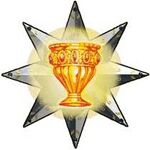Al'Akbar
| Al'Akbar | ||
|---|---|---|
 |
||
| Aliases | High Cleric, Restorer of Righteousness | |
| Alignment | Lawful Good | |
| Divine Rank | Demigod | |
| Pantheon | Oerth (Baklunish) | |
| Portfolio | Dignity, Duty, Faithfulness, Guardianship | |
| Domains | Community, Good, Healing, Law, Protection | |
| Home Plane | Soqed Hezi (Celestia) | |
| Worshippers | Paynims, paladins, fighters, judges, teachers | |
| Favoured Weapon | Falchion | |
Al'Akbar is the Baklunish god of guardianship, faithfulness, dignity, and duty.
History[edit | edit source]
Al'Akbar was originally a cleric of the Baklunish gods who survived the Invoked Devastation. The Baklunish gods tasked him with restoring the people back to the path of righteousness and dignity, and to help him he was given a golden cup and a platinum talisman in the shape of an eight-pointed star, which would later go on to be named after him. Al'Akbar went onto teach the Baklunish that true religion should include proper devotion to the gods, protection of the community, and guidance of the faithful, and the people begun to worship him alongside their other gods, eventually raising him to godhood. He actually has enough worshippers to reach a higher status among the gods, but chooses to remain a demigod out of respect for the rest of the pantheon.
Worshippers[edit | edit source]
Al'Akbar is worshipped mainly among the Baklunish people, and his faith is divided in two competing sects, with smaller ones among the Paynims. The Exalted Faith is centered in Ekbir, the caliph of the land is the head of the faith, their clerics are called qadi, they emphasize diplomacy, rhetoric, and academic achievement, and tend to be either Lawful Good or Neutral Good. The True Faith is centered in the Yatil Mountains, the Grand Mufti is the head of the faith, their clerics are called mullahs, they emphasize hard work, obedience, and plain speech, and tend to be Lawful Neutral.
Dogma[edit | edit source]
Be as a vessel of kindness and emblem of devotion, for the righteous man is both steadfast and merciful. Be not as the untutored infidel, but rather heed your superiors, and submit to their wisdom and guidance. Let the faithful strive always to nurture the seed of Good in the soil of Law, that by doing so they are received into the Garden of Al’Akbar.
The Cup and Talisman of Al'Akbar[edit | edit source]
The Cup and Talisman of Al'Akbar were given to the High Cleric to aid him in his task, and became symbols of his power after his ascension. They were kept in his mosque in Ekbir until 219 CY, when a group of elves stole them, leading to the current split between the faithful.
The cup is made of hammered gold, chased with silver filigree, and set with twelve great gems. Seven times a day, any water poured into the cup, and kept in it, turns into a potion of Cure Light Wounds and its holder can cast Bless once per day. The talisman is made of hammered platinum in the shape of an eight-pointed star, chased with gold inlays, and with a small gem tipping each point. The star depends from a chain of gold set with silver beading. The wearer can cast Remove Disease at will, and Remove Curse once a day. Possessing both items will allow the owner to cast Resurrection three times a week.
Despite being artefacts of a Lawful Good god, they can utterly hose their bearers. If a nongood being has custody of either of the items, they lose a point of Constitution every day, two points if they possess both, and nothing short of a casting of Wish or Miracle will restore the lost points. If they lose all constitution, they die and rise up as a deathless guardian bound to the cup. Possessing both will also force all who see them to succeed a will save or be overwhelmed by greed and attempt to steal the items.